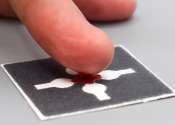Scientists develop new battery-free lactic acid sensor
Scientists at Bath, have introduced a breakthrough carbon-based sensor for detecting lactic acid levels in saliva—avoiding the need for an electrical power source.
ACS Sensors is a peer-reviewed research journal that is devoted to the dissemination of new and original knowledge on all aspects of sensor science that selectively sense chemical or biological species or processes. Articles may address conceptual advances in sensing that are applicable to many types of analytes or application papers which report on the use of an existing sensing concept in a new way or for a new analyte. Application papers should demonstrate the use of the sensor in complex samples, show it is fit-for-purpose, and exhibit a correlation of the sensor’s performance with an existing analytical method. Papers may focus on sensor development for commercialization or developing sensors that are used to provide new scientific knowledge. Articles may be entirely theoretical with regard to sensing, or they may report experimental results.

Scientists at Bath, have introduced a breakthrough carbon-based sensor for detecting lactic acid levels in saliva—avoiding the need for an electrical power source.
Nanomaterials
May 22, 2024
0
1

When you need to measure white blood cell counts, it usually involves trips to clinics and expensive equipment for analysis. Likewise, checking water quality for contaminants can be a lengthy process.
Biochemistry
Mar 28, 2024
0
25

A paper-based platform developed by researchers at the Indian Institute of Science (IISc) and Jawaharlal Nehru Center for Advanced Scientific Research (JNCASR) could help quickly detect the presence of antibiotic-resistant, ...
Biochemistry
Feb 15, 2024
0
6

Microscopic magnetic probes that change shape in response to their environment may greatly enhance magnetic resonance imaging (MRI). However, producing the probes, which are still experimental and have not yet been used in ...
Analytical Chemistry
Dec 20, 2023
0
17

Blood tests are a common, yet often painful, step in health care. But what if we could skip the needles altogether? Saliva and blood contain many of the same biomarkers, and collecting spit is as simple as drooling into a ...
Biochemistry
Nov 29, 2023
0
1

By some estimates, the human nose can detect up to a trillion different smells with its hundreds of scent receptors. But even just catching a quick whiff of certain chemicals known as nerve agents can be lethal, even in tiny ...
Analytical Chemistry
Aug 9, 2023
1
34

Human sweat is a rich source of health information, offering insights into a person's hydration level, electrolyte balance, and overall physiological state. For instance, lactate level in sweat is a useful biomarker of exercise ...
Biochemistry
Jul 18, 2023
0
9

Wearable sensors are becoming a promising tool in personalized health care and exercise monitoring. In a recent study, researchers from Japan have developed a novel wearable chemical sensor capable of measuring the concentration ...
Analytical Chemistry
Jul 6, 2023
0
30

Texas A&M AgriLife Research scientists and collaborators at Iowa State University have developed a sensor chip that can detect many disease pathogens with 10 times the sensitivity of currently available methods.
Analytical Chemistry
Jun 21, 2023
0
73

Qun Ren, an Empa researcher, and her team are currently developing a diagnostic procedure that can rapidly detect life-threatening blood poisoning caused by staphylococcus bacteria.
Bio & Medicine
Jun 1, 2023
0
51